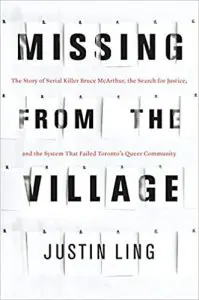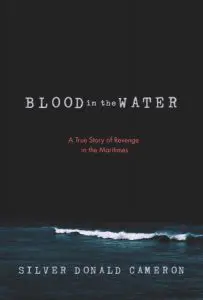
by Justin Ling
McClelland & Stewart, 304 pages
Just what are the police for? With recent calls for their defunding (whatever that may mean) it’s a question that’s become a political football. And by the evidence of these two new Canadian true crime books, it’s one worth deeper consideration.
The Toronto police took a lot of fire for their handling of the serial killings that took place in the city’s gay village from 2010 to 2017, which ended in Bruce McArthur pleading guilty to the first-degree murder of eight men. Even before McArthur’s apprehension, however, the police had been hit with allegations of racism and victim-blaming during their investigation, poor communication with the LGBTQ community, and running a generally slack operation.
Justin Ling, a reporter who covered the case, deals with all of these issues in Missing from the Village. Instead of a true crime book “which spectates from afar” it’s one that’s embedded in the story it tells. This makes it of a piece with a recent trend in true crime that critic Laura Miller addressed in 2017: the true-crime/memoir hybrid, which wraps a crime story in subjectivity. Ling is, or at least wants to be, part of the story, even to the point where he starts “chasing leads” relating to other missing-person cases.
A member of the gay community that McArthur was also a part of, and preyed upon, Ling has a valuable perspective. Sometimes, however, the politics seem forced. Ling takes offence at the term “gay lifestyle,” though he doesn’t explain what relevance this has to the investigation. He thinks using the word “dumping” to describe how serial killers get rid of their victims’ bodies relates to how queer people are seen as disposable, meaning killers of queer people have internalized society’s homophobic judgments. In fact, it’s a word used throughout crime literature to describe how killers dispose of their victims’ remains.
The book is strongest in its sympathetic portrayal of McArthur’s victims, which is where most true-crime books falter (in contrast, McArthur himself is only a cursory sketch). But on the subject of the role of the police, for good or ill, things end on a messy note. “Where, exactly, the system failed is hard to say,” Ling concludes. He calls the story a “ringing endorsement” to defund the police, but wants to add a note of caution. A lot of the work police do falls outside their areas of professional expertise. “Police officers are not Swiss Army knives. They cannot fix every problem.”
I’d hesitate to be too critical of the police in this instance. They did catch McArthur. The public is misled by TV cop shows that suggest police have near-infinite resources and capabilities. In fact, there are real limits to what the police are able to do and many investigations of the most serious cases rely on a good deal of luck and public co-operation.

by Silver Donald Cameron
Viking, 244 pages
These limits were strikingly exposed in the case of the murder of Philip Boudreau in 2013, which is explored in Silver Donald Cameron’s Blood in the Water. Boudreau was a serial offender and general ne’er-do-well with a reputation among the Cape Breton community of Petit de Grat for stealing lobster traps and uttering threats of violence. One day he seems to have taken things too far, leading to his being killed by some angry fishermen.
How did things get to this point? Boudreau was notorious, but the police seemed powerless to rein him in. This, in turn, led to the RCMP and the Department of Fisheries receiving some justifiable blame for what happened. Among the chorus of “island voices” that Cameron records we hear “The police won’t do frig-all,” “Phillip wouldn’t have died if the RCMP and the Fisheries officials had been doing their job,” and “Whatever James and Dwayne [the accused]get, the last three RCMPs and the last three Fisheries officers should get the same, because it’s just as much their fault.”
For their part, authorities made the usual excuse about lack of resources—a call to fund the police, if you will. Cameron gives this a hearing, but is more sympathetic to the men accused of “taking the law into their own hands.” What else could they do? In a courtroom, abstract legal ideals often assume that “the enforcement system is able to do things that it patently cannot do, like provide real protection to citizens in danger of being murdered.”
Cameron, like Ling, was very much a member of the community he describes (he died shortly after completing the manuscript of Blood in the Water), making his book another hybrid true-crime/memoir. And just as both books address the culpability of the police, or “the system,” in failing to keep the peace and protect the public, they also ask some questions of their communities; so in addition to memoir, there’s history and sociology at play here as well.
There will likely be more written on the high-profile McArthur case, perhaps a more direct and traditional telling of the story, but Ling’s book gives us both a personal and wider-ranging consideration of many of the timely issues it raises. In Blood in the Water, on the other hand, Cameron has delivered a CanCrime classic, one that takes the full measure of community and justice.
—From CNQ 108 (Fall/Winter 2020-2021)
We post only a small fraction of our content online. To get access to the best in criticism, reviews, and fiction, subscribe!
